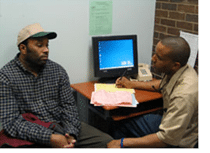Project Brotherhood promotes spiritual, physical and economic health
When we often speak of improving black health, the conversation usually focuses on black women and children—rarely does it include black men. And that’s unfortunate, given that African-American men are more likely to die from a range of health issues compared to their white counterparts.
Thankfully Project Brotherhood (PB), a Chicago-based organization, chooses to take the health needs of black men very seriously. Nestled in the South Side neighborhood of Woodlawn, PB provides a range of medical and social services to ensure that their clients have access to care.
We sat down with the Project Brotherhood’s Executive Director Marcus Murray and Youth Coordinator Perrin Greene Jr. and talked about the obstacles men face in accessing care and the impact that gun violence has on the black men’s mental health.
What are some of the major barriers that African-American men face in accessing health care?
Murray: First, there is a huge mistrust of the medical community and not enough hospitals in the ‘hood. We also don’t see enough medical providers that look like you and talk like you. There is also the pressure of being macho and thinking that if you go to the doctor then you are weak.
But the time that clinics are open is also a factor. Most clinics are open from 9 a.m. to 5 p.m. and if you can’t take off work, you can’t get the care that you need. Project Brotherhood closes at 7 p.m. to avoid that problem. Most important, our clinic is male-centered with posters in the clinic showing faces of men, which invites men to know that this clinic is about them, for them.
What are some of the programs and initiatives that Project Brotherhood does for men in the community?
Murray: Obviously we provide all types of medical care and screenings such as diabetes, HIV and other health issues at our onsite clinic. But we realized that it’s important to provide social services, too, such as support groups, free haircuts, meal programs and programs that talk about what it means to be a man.
We help brothers prepare for jobs, help them with their resumes and open up email accounts for them. We also refer them to other places for help. For us, health is physical, mental, emotional and economic. And if one of those things is off, the man is not healthy.
Greene: Unfortunately a lot of projects for younger black men have been cut due to lack of funding, but we provide mentoring through sports, summer programs, college tours and job shadowing. We also do street outreach, were we pass out health packets that include a sandwich, condoms and information about PB.
Health is more than just the body. How has gun violence affected your clients’ mental health?
Greene: Gun violence has had a deep impact on our clients. The baby that was shot and killed in the car hit really close to home. It happened in our neighborhood.
And so we talk about exercise and physical, but a lot of men don’t feel safe being active outside and don’t know where to go. Project Brotherhood serves as a safe haven, not just as a safe place to work out and play basketball, but to talk about one’s feelings.
And it’s not easy, because mental health care in our community comes with a lot of stigma. Plus, society tells men you are not supposed to share your emotions and if you do, you are weak. Thankfully, we have found that our support groups have made a difference and we make our male clients feel comfortable and supported.
Any words of wisdom to encourage better health for our male readers?
Greene: Stay true to yourself and get a physical, regardless [of] if you feel fine or nothing is swollen or broken. Get your HIV test, your prostate cancer screening and blood pressure checked. Early prevention is key.
Murray: It’s about being that warrior. Understanding that it’s deeper than you.
We need you to be around, be here for your kids and be better leaders. So take ownership of you life, your health and your body.
For more about men’s health and Project Brotherhood, go to BET.com.






